#touchpoints
Explore tagged Tumblr posts
Text
Toi uu diem cham khach hang nang cao trai nghiem thuong hieu
Trong thời đại kỹ thuật số, các điểm chạm thương hiệu đóng vai trò quan trọng trong việc xây dựng và duy trì mối quan hệ với khách hàng. Mỗi lần khách hàng tương tác với thương hiệu, từ các quảng cáo trực tuyến đến dịch vụ hậu mãi, đều là cơ hội để doanh nghiệp ghi dấu ấn. Khi các điểm chạm thương hiệu được tối ưu hóa, chúng có thể giúp cải thiện trải nghiệm người dùng, từ đó tạo dựng lòng trung thành và nâng cao uy tín thương hiệu.
Tìm hiểu điểm chạm khách hàng là gì?
Điểm chạm khách hàng (customer touchpoints) là tất cả những tương tác mà khách hàng có với thương hiệu trong suốt hành trình mua hàng, từ lần đầu tiên họ tiếp xúc đến sau khi mua hàng. Đây có thể là tương tác trực tiếp (như tại cửa hàng, qua dịch vụ chăm sóc khách hàng) hoặc gián tiếp (như qua quảng cáo, website, mạng xã hội). Việc tối ưu hóa các điểm chạm này giúp thương hiệu xây dựng mối quan hệ lâu dài và tạo lòng trung thành từ khách hàng.
>>> Nguồn tham khảo: https://stradexvietnam.com/blog/diem-cham-khach-hang-customer-touchpoints

Các nhóm điểm chạm khách hàng
Điểm chạm khách hàng xuất hiện ở nhiều giai đoạn khác nhau của hành trình khách hàng, có thể được chia thành ba nhóm chính:
Trước khi mua hàng: Đây là giai đoạn nhận thức, khi khách hàng lần đầu tìm hiểu về thương hiệu qua quảng cáo, mạng xã hội, hoặc các bài đánh giá trực tuyến. Tại giai đoạn này, thương hiệu cần tạo ấn tượng tốt bằng nội dung hữu ích, giao diện website dễ sử dụng, và chiến lược tiếp cận rõ ràng.
Trong khi mua hàng: Khi khách hàng đang cân nhắc và quyết định mua sản phẩm, các điểm chạm như trải nghiệm mua sắm trực tuyến hoặc tại cửa hàng, sự hỗ trợ từ nhân viên, và chính sách thanh toán là những yếu tố quyết định đến sự hài lòng của họ.
Sau khi mua hàng: Giai đoạn này quan trọng để duy trì mối quan hệ lâu dài. Các điểm chạm bao gồm dịch vụ hậu mãi, chương trình khách hàng thân thiết, và cách thương hiệu xử lý phản hồi, khiếu nại từ khách hàng.
Tạo điểm chạm khách hàng dựa trên Customer Journey
Trong giai đoạn trước khi mua hàng, điểm chạm khách hàng tập trung vào việc nâng cao nhận thức và thu hút sự quan tâm. Điều này có thể bao gồm quảng cáo trên các phương tiện truyền thông, nội dung trên website và mạng xã hội, hay thậm chí là những lời giới thiệu từ bạn bè. Mục tiêu ở đây là tạo ấn tượng tích cực và khơi gợi nhu cầu của khách hàng tiềm năng. Ví dụ, một video quảng cáo sáng tạo hoặc một bài viết blog hữu ích có thể là những điểm chạm hiệu quả trong giai đoạn này.
Khi khách hàng bước vào giai đoạn mua hàng, các điểm chạm tập trung vào việc hỗ trợ quá trình ra quyết định và tạo điều kiện thuận lợi cho giao dịch. Điều này có thể bao gồm trải nghiệm tại cửa hàng, giao diện website thân thiện, chatbot hỗ trợ trực tuyến, hay quy trình thanh toán đơn giản. Mỗi điểm chạm đều là cơ hội để thương hiệu thể hiện giá trị và xây dựng niềm tin với khách hàng.
Sau khi mua hàng, các điểm chạm tập trung vào việc duy trì mối quan hệ và khuyến khích lòng trung thành của khách hàng. Điều này có thể bao gồm email cảm ơn, hướng dẫn sử dụng sản phẩm, chương trình chăm sóc khách hàng, hay thậm chí là một cuộc gọi theo dõi để đảm bảo sự hài lòng. Giai đoạn này cũng là cơ hội tuyệt vời để thu thập phản hồi và cải thiện sản phẩm, dịch vụ.
Bằng cách tạo và quản lý hiệu quả các điểm chạm khách hàng trong suốt hành trình khách hàng, doanh nghiệp có thể xây dựng một trải nghiệm tổng thể mạnh mẽ, thúc đẩy sự hài lòng và lòng trung thành của khách hàng. Điều quan trọng là phải đảm bảo tính nhất quán và liên kết giữa các điểm chạm, tạo nên một câu chuyện thương hiệu mạch lạc và hấp dẫn. Cuối cùng, việc liên tục lắng nghe và phản hồi khách hàng sẽ giúp doanh nghiệp không ngừng cải thiện và tối ưu hóa các điểm chạm, từ đó nâng cao hiệu quả của toàn bộ hành trình khách hàng.

Cách tối ưu hóa điểm chạm khách hàng
Để tối ưu hóa các điểm chạm khách hàng, doanh nghiệp cần lưu ý những điều sau:
Hiểu rõ đối tượng khách hàng mục tiêu: Thương hiệu cần phân tích hành vi, sở thích và nhu cầu của khách hàng để biết rõ những điểm chạm nào là quan trọng nhất. Điều này giúp tạo ra các chiến dịch tiếp cận cá nhân hóa, nâng cao trải nghiệm khách hàng từ giai đoạn nhận thức đến sau khi mua hàng
Theo dõi hành trình khách hàng: Bản đồ hành trình giúp doanh nghiệp nắm bắt rõ từng điểm chạm của khách hàng với thương hiệu, từ đó cải thiện từng khía cạnh để mang lại trải nghiệm tốt hơn. Ví dụ, Spotify đã sử dụng bản đồ hành trình để khuyến khích người dùng chia sẻ nhạc nhiều hơn.
Theo dõi và đánh giá phản hồi khách hàng: Việc lắng nghe phản hồi của khách hàng tại từng điểm chạm sẽ giúp doanh nghiệp phát hiện những khía cạnh cần cải thiện, từ đó tối ưu hóa trải nghiệm tổng thể. Điều này cũng giúp doanh nghiệp xây dựng mối quan hệ tốt hơn với khách hàng thông qua việc lắng nghe và đáp ứng nhu cầu của họ.
Kết luận
Tạo điểm chạm khách hàng là yếu tố then chốt giúp thương hiệu thu hút và giữ chân khách hàng. Bằng việc tối ưu hóa từng tương tác với khách hàng, doanh nghiệp không chỉ nâng cao trải nghiệm mua sắm mà còn xây dựng mối quan hệ lâu dài với khách hàng, từ đó tạo ra lợi thế cạnh tranh bền vững.
0 notes
Text
this week's word is...
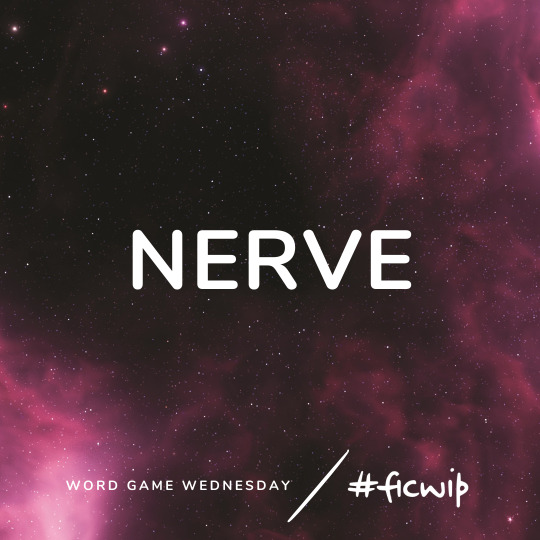
Find the word in any WIP and share the sentence containing it. Reply, reblog, stick it in the tags, tag us in a new post, or keep it private. All fandoms, all ships, all writers welcome.
#word game wednesday#according to my list#we have done this 252 times since 2020#this was a discord game we used to play during bangs#but when lockdown started#a bunch of us kept forgetting what day it was#so I started playing this every Wednesday as a touchpoint#and then we just never stopped
136 notes
·
View notes
Note
seeing you get so excited about fiber arts is honestly so exciting & validating, especially as a "no longer a cute uwu smol bean" trans man in my 30s. it always feels so unpleasant being in fiber arts groups where people will address the whole group as "ladies," and it's really nice to have the reminder that there's more guys like me out there. (also that sherlock holmes shawl that you reblogged a couple days ago as of me sending this ask is a super easy pattern, and this is me giving the unsolicited advice of "turn your work after each round if you're making a granny square that big so you don't get the vortex of doom")
Thank you for the advice on the blanket!
It's ironic -- since transitioning, I am very cognizant of how much space I can take up as a man, but when it comes to my presence in the fiber arts, I do make it a point to push back on being treated as a novelty just because I am male.
But I also don't like citing things like, "Well, sailors used to do embroidery," to explain myself. I'm just tired of the gender essentialism all around. I like making things, and sometimes they are practical things and sometimes they are decorative things and sometimes they are both.
I do make it a point to participate in group chit-chat, especially when the ladies think I am ignorant or have no experience in whatever topic they are discussing. It's very funny to me to see their surprise, but it also helps, in a small way, to fight gendered thinking .
#chit chat#I always like dropping casual lore bombs how I've been cross-stitching since I was like 10#or that I used to make potholders as a kid with those loom kits#or the bead looms#I've got most those shared childhood touchpoints even home ec.
163 notes
·
View notes
Text
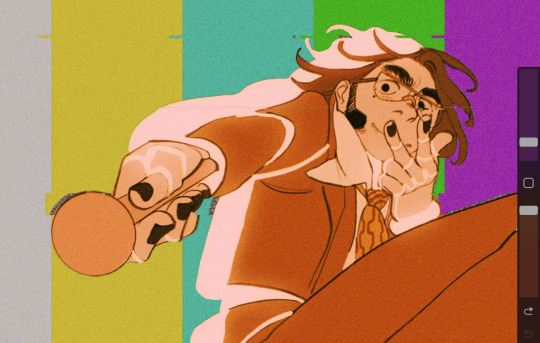
i did not do it right but the idea is like. floating planes that always face the viewer while if you get a different camera angle, it's just blank/unrendered. and i forgot to colour most of this
there were a few popular urban legends about what was "really" underneath his visual effect (at the tv show's heyday, one of the most common theories was that underneath, he was a human actor in a greenscreen suit). audiences of his show never saw the unrendered side of him because they only ever saw him on-screen in the studio. and he looked perfectly normal there, with video quality insufficient to show anything unusual
during The Incident, people entered his resonance chamber for the first time and got to be in the same room as him. seeing him from more than a single fixed camera angle was later described as viscerally upsetting
#imimata rampant#for his part he was encoded with limitations on what he could show to the camera#and he had a great time not following those limitations when the time came#this is all prior to the advent of computer generated graphics so there's no real cultural touchpoint on 'uncanny valley' graphics#it's just here's a guy who looks normal on a screen but in person he's a tesseract that only seems normal from one specific viewing angle
116 notes
·
View notes
Text

You're a coward. You're afraid to stand alone.
holy fuck. Julian 'I recognize my patient has made a decision. given that it's a fucked up decision I don't want staining my hands I have resolved to go machiavellian on it it to try to change it' Bashir (SO so deeply affectionate). he went up to the space pope and looked her in the eye and called her a fucking coward to her face after mercilessly picking apart the realpolitik of the situation step by step. baby you and your dubious medical ethics are all to me.
#SUCH a characterization touchpoint omg fsdhkfa. has he ever been hotter than in righteous wroth mode#his parting 'sure i'll see you in hell' sentiment to kai winn when she tries to intimidate him.......#julian bashir#star trek#star trek ds9#ds9#poor poor kira getting kind of sidelined in this one tho. 'yeah sorry about your boyfriend. we replaced his brains with robo parts#but this isn't about you right now somehow' (her last scene with him was very good tho :'( bye bareil you sure. have been here)
268 notes
·
View notes
Text
okay i do have one thing to say about Truth Scrapper. id5 has cited brandon sanderson as a worldbuilding inspiration, and one of his books, warbreaker, features a magic system that has a lot to do with color!
i don't know if id5 has read this book in particular, but if she has, then she probably would have thought about it while creating TS's magic system. though who knows if it was an inspiration or an "oh fuck i better make sure not to be too similar" or both! (but that's only if they've actually read it, which i'm not sure of, bc iirc they've only mentioned the stormlight archive by name — though in my experience anyone who has read that huge series has probably checked out some of bsand's other works as well.)
edit: id5 says she hasn’t read it, lol. tbh now i’m even more curious to see how the magic systems end up comparing…
here's a description of warbreaker's magic system off of the wiki:
All individuals are born with a single Breath, which can be willingly transferred or given away to another individual. A Breath can be thought of as a soul, or as the manifestation of the 'sixth sense'. A person with no Breaths is called a Drab. Drabs find it difficult to perceive color and do not experience the 'sixth sense' or the odd sensation resulting from someone watching one unobserved. The prominent use of magic on Nalthis is called Awakening, and is reliant on the presence of color and verbal Commands given by the magic user, as well as the use of Breath. Heightening - A person that holds multiple Breaths gains certain innate abilities, such as perfect pitch, [perfect color recognition] the ability to sense life, and a resistance to disease. The various amounts of Breath required to obtain these abilities are referred to as Heightenings. Awakening - The use of Breaths to bring inanimate objects to life, draining color from nearby objects. The actions of the Awakened object are dependent on the Command used at the time of Awakening. Breaths used to Awaken an object can usually be recovered by the Awakener, returning the object to normal. Lifeless - Corpses (usually human) that have been Awakened. A technique discovered during the Manywar allowed for the creation of Lifeless with only a single Breath. Since then, Lifeless have been used extensively as laborers and soldiers. Returned - Individuals that return to life after dying, but without any memories of their previous life. Returned have a single divine Breath, which grants them all the innate powers of the Fifth Heightening, as well as other unique powers such as the ability to change their form. A Returned must consume one of their held Breaths every week. If they are forced to consume or give away their divine Breath, they will die.
notably, the world of TS seems to be primarily greyscale but with some saturated objects, which is the opposite of warbreaker's world where most objects have color, which can be drained via magic. unless most of the color in TS has just already been used up...
#should i main tag this. on one hand the only reason i'm posting it is bc it might be relevant to ppl's theorycraftying#but on the other hand id5 is probably checking the main tag and it's kinda rude to compare artists' work to other artists....#but. the same rules of 'don't be rude in tumblr tags' don't always apply to. successful published creators#shrug#i suppose i will maintag it if just for any oomfs who have it filtered lmao#if you see this id5 i promise i don't think you're copying 🙏😭 it's just an interesting touchpoint for comparison!!#truth scrapper#s.ts
34 notes
·
View notes
Text
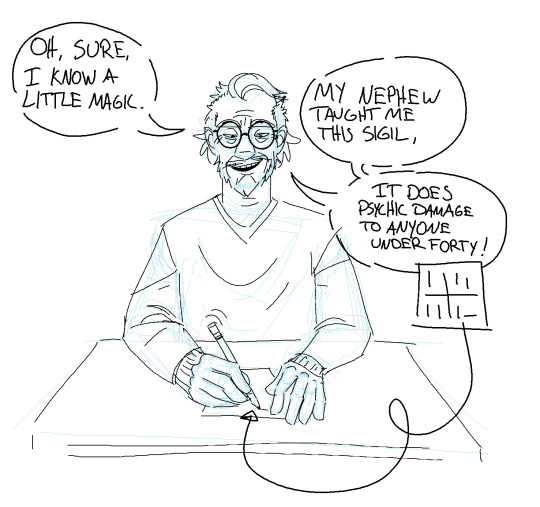
when your tabletop system of choice says that everyone knows magic by default, you gotta get creative with how your otherwise completely nonmagical guy knows anything about casting spells
#ragsycon exclusive#ragsymakes#oc kenneth#also yes i am AWARE of the alternative weird moves in place of use magic#it's just that kenny is my first motw character i get to have as a player instead of a keeper so i wanted the full flavor for my first time#canonically his late wife knew magic and she taught him some simple sigil spells#all his magic has to be written down to be cast#luz owlhouse style i guess? for lack of a more well known touchpoint
100 notes
·
View notes
Text





chainsaw man by tatsuki fujimoto // "pennsylvania furnace" by lingua ignota
#bolo liveblogs#chainsaw man#web weaving#it's been ages since I read csm but I'm cleaning out my drafts#pennsylvania furnace has a lot of touchpoints in denji's life in csm 1 actually. I could make a more elaborate post later
19 notes
·
View notes
Text
Turtles Catches Up With Old GMMTV: The Bad Buddy Rewatch Edition, Part 3a -- BBS and Asian Cultural Touchpoints
[What’s going on here? After joining Tumblr and discovering Thai BLs through KinnPorsche in 2022, I began watching GMMTV’s new offerings -- and realized that I had a lot of history to catch up on, to appreciate the more recent works that I was delving into. From tropes to BL frameworks, what we’re watching now hails from somewhere, and I’m learning about Thai BL's history through what I’m calling the Old GMMTV Challenge (OGMMTVC). Starting with recommendations from @absolutebl on their post regarding how GMMTV is correcting for its mistakes with its shows today, I’ve made an expansive list to get me through a condensed history of essential/classic/significant Thai BLs produced by GMMTV and many other BL studios. My watchlist, pasted below, lists what I’ve watched and what’s upcoming, along with the reviews I’ve written so far. Today, I offer the first half of the third (ha!) of five posts on Bad Buddy. I'll look today at themes that myself and fellow Asian fans of Bad Buddy have caught and related to in this wonderful show.]
Links to the BBS OGMMTVC Meta Series are here: part 1, part 2, part 3a, part 3b, and part 4
As a lifelong viewer of Asian dramas, and as an Asian-American myself, I know why I'm drawn to Asian dramas. We all have our reasons for belonging to this widespread fandom, whether you're watching queer or het Asian dramas, consuming Asian music, all of it.
What are my reasons? The first and foremost one is relatability. Especially in Asian dramas, I relate to the spoken and unspoken communication of the dramatic characters as they navigate life's highs and lows. I relate to the way Asian dramatic characters engage with their families, their partners, their children, their colleagues, the world and societies around them. I relate to the ways in which societies are drawn and constructed, to the economic and emotional pressures that characters face. As an American -- I don't fully relate to the majority of experiences that white American characters face dramatically, because I'm not a part of the majority. As an Asian? I get almost all of what Asians are going through in dramatic art (save for, say, Korean or Japanese historicals, ha — but I do indeed get Asian patriarchy and sexism).
I'm not queer -- I am a cishet Asian woman -- but what I appreciate about queer Asian media is, very often, the media's tendency to not be shy about the various and intricate ways that discrimination, sexism, trauma (intergenerational, emotional, etc.), and many more social and emotional phenomena interplay in an individual's life.
When I first watched Bad Buddy, I had the strong sense that what I was watching was incredibly relatable to much of my upbringing and life as a young adult, working out issues vis à vis my family and my eventual partner. Bad Buddy, thematically, captured a tremendous amount of the realities of everyday Asian life for young people.
Bad Buddy exists in the GMMTV bubble of No Homophobia (cc @bengiyo and @lurkingshan, as we have spoken about the GMMTV bubble). However, what Bad Buddy didn't shy away from were explorations of many other social/emotional/cultural themes and frameworks of everyday life, from sexism, to youth bias, to boundaries and enmeshment, and many, many more.
I wrote in my first-ever Bad Buddy thesis that the framework of intergenerational trauma was the main theme I identified -- and identified with -- in the show. But, as I was contemplating writing this series of Bad Buddy meta posts, I wanted to know: what did my fellow Asians pick up in this show that they saw, and that they related to? In other words: what makes Bad Buddy particularly special to Asian fans of the show?
So, I did a thing. I gathered together a few BBS Asian stans, like myself, for a lengthy (and still ongoing!) discussion about what we related to in Bad Buddy. I want to thank, from the bottom of my heart, @telomeke, @grapejuicegay, @recentadultburnout, @neuroticbookworm, and @lurkingshan (who's not Asian, but has Asian relatives, and gets us!) for being up for creating a spontaneous mini-village together to talk Bad Buddy and its inherent Asianness.
It sounds redundant to identify Bad Buddy, a show made by Thais and set in Thailand, as an "Asian" or "Thai" show. It's definitely not a show that steps back to take a look at itself and say, "oh hey, this is really 'Thai,' what we're doing here." When I asked @recentadultburnout directly about what they might have identified as uniquely Thai about Bad Buddy, RAB thought about it and said -- maybe Pat's ranak ek (Thai xylophone). Other shows of Aof Noppharnach's, including He's Coming To Me, Moonlight Chicken, and even the start of Last Twilight, highlight many facets of Thai life, from the spiritual to the everyday-cultural (even Gay OK Bangkok does this a bit, too). But Bad Buddy doesn't really go there by way of overt symbolism and/or specifically Thai spiritual/cultural practice.
The Asianness of Bad Buddy is far more inherent. It is rooted and coded in the way people interact with each other.
An overt example occurs in episode 10, when Dissaya confronts Ming in the Jindapat home, and announces that she will reveal Ming's secret, dropping the effort she has made her entire life to "save face" -- her reputation AND Ming's reputation.
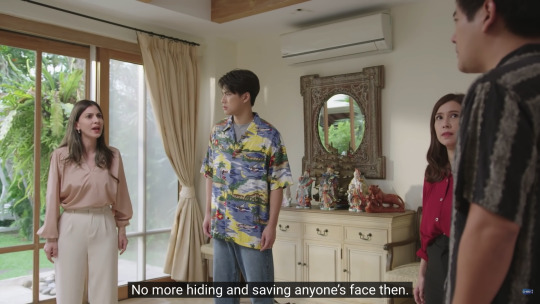
During my first Bad Buddy rewatch, I was so moved in fury by this scene that I had to blog about it as if I had never seen it before. There's so much encapsulated in this moment: the pressure that Dissaya has put on herself to keep the embarrassing secret that she lost a scholarship; the effort she made to keep Ming's theft of the scholarship a secret, to save his face, and the secrets she kept from Pran to save her face, and to keep up the façade of rivalry between the Jindapats and the Siridechawats. She was letting a whole hell of a lot loose in this moment, because the eternal pressure of saving face in Asian societies is, frankly, never-ending.
"Saving face" is an incredibly important notion in many Asian collectivist cultures. Saving face is about an individual or a family projecting an image of calm, cool collectedness and success, in order to not make waves within a collectivist society for any reason. If you are not working to seem like you are going with the flow of life, if you're not keeping up with the Joneses, the Kardashians, whoever -- you are not saving face. If you are in poverty, and are projecting an image of poverty, instead of pretending to be more wealthy than you are -- you are not saving your face or your family's face. If you allow yourself to get publicly defeated -- you are not saving face. Dissaya gave up a lot of her hard-earned reputation in the moment she confessed the truth in front of Pat and Pat's mother.
My Asian friends and I can click wordlessly into understanding the pressure of saving face; say that I didn't get good grades in school? I wouldn't be saving my parents' face. This kind of pressure to keep up with particular social dynamics within and external to family, within Asian societies, is a neverending drumbeat of pressure.
Besides saving face, there are many other Asian cultural touchpoints that were contained within Bad Buddy that my fellow Asian BBS stans and I noted. They include:
1) intergenerational/inherited trauma, 2) the unique nature of secret-keeping in Asian cultures/societies, 3) enmeshed family boundaries, 4) setting up children to compete against each other for the sake of familial pride, 5) patriarchy, sexism, and the reversal of sexism among next generations, 6) the inset/assumed roles of family members based on patriarchy and elder respect, 7) Assumed community within and external to one's family, usually based on where you live and where you go to school, 8) How one's identity is defined based on patriarchy and individualist vs. collectivist cultures, 9) How various cultures within an Asian nation live peacefully (or not) together (for example, what makes Pat and Pran different by way of Pat's Thai-Chinese heritage vs. Pran's ethnic Thai heritage),
and many, many more.
It'll be impossible, even over two posts, to analyze all of these cultural touchpoints, but a few of them engendered quite a bit of conversation among the BBS mini-village that I want to highlight. In this post, I'll focus on the continuation of my first BBS thesis on intergenerational/inherited trauma, the nature of secret-keeping in Asian societies, and will return briefly to the touchpoint of saving face.
One of the most devastating scenes for me in Bad Buddy is in my favorite episode, episode 10, when Pat (after he's learned, throughout the episode, of the extent of the lies that his and Pran's family have shared with their children) confronts his father about his father's demands to literally control Pat's emotions, the way in which Pat related to other people -- specifically Pran. Pat sums up a lifetime's worth of control in one sentence.
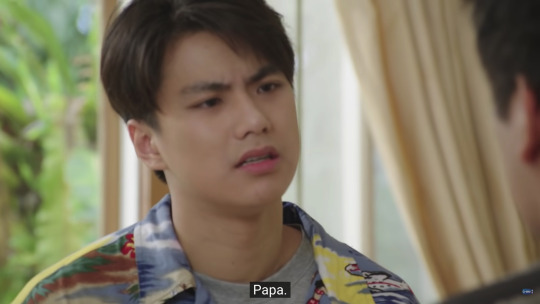
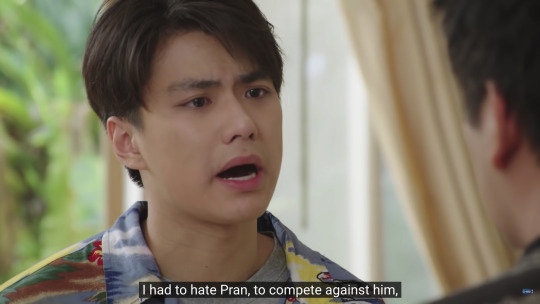
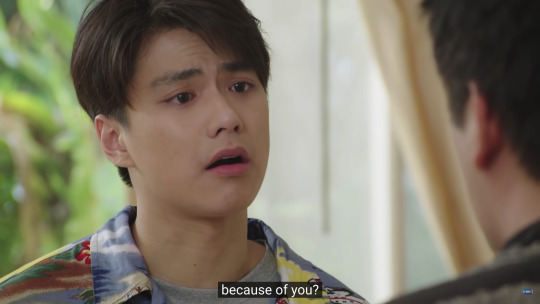
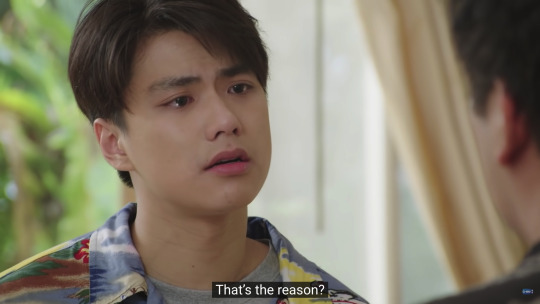
@telomeke noted in our ongoing group conversation that this notion of inherited trauma vis à vis Ming is particularly present in Asian societies, not just by way of familial expectation that we, as Asians, embody it and "take it" throughout our generations, as Pat realized up above -- but that ALL family members present are responsible for playing their roles within the framework of the inherited trauma. @telomeke noted in particular that exactly what Pat was doing to hate Pran, FOR his father? That was what Ming HAD to do for MING'S dad, when Ming schemed to get the scholarship from Dissaya. AND, Pat's mother, in consoling Pat, had to play the role of explainer -- which, as we know now, Pat ran away from to meet his beloved Pran on the rooftop before running away to the eco-village.
Pat running away from that moment? That was a huge symbol of the breaking of the inherited trauma that was given unto him by his parents both.
(@telomeke has actually written about their theory about how the Jindapats and Siridechawats ended up living next door to each other -- which seems SO STRANGE on the surface, consider Ming's and Dissaya's boiling hatred for each other -- and the theory links nicely within the framework of inherited trauma. Tel theorizes that Ming's father or grandfather may have actually gifted the house to Dissaya's family as a means of apologizing for Ming's deceit. In which case: the presence of the Siridechawats is a reminder, on an everyday basis, of Ming's folly to steal from Dissaya, which may explain why Ming in particular went so hard on Pat to triumph daily over Pran.)
We as a group unwound quite a bit on the nature of secret-keeping in Asian cultures. We know Bad Buddy relies on this cultural touchpoint at the end of the series: Pran and Pat have a full-fledged and committed relationship as a transparent secret, under the noses of Pat's and Pran's parents.
Secret-keeping....oh, man. I could not have lived a fully authentic life in America if I didn't keep a million secrets from my family while I was living out my own independent choices. I actually, literally, could not have gotten married, because the rule of my household was that I wouldn't date. I would just... get engaged. So I'd get engaged through, what, magic? Match-making? No: I'd have to find my partner through my own battle of social and familial conventions, literally against my family, to get to where I wanted to be in life, which was (gasp) married.
@neuroticbookworm illuminated more on this particularly from our shared Indian lens. She wrote,
Keeping your relationship secret from parents is sooooo ridiculously common in India (and I'm sure we can extrapolate to other Asian countries like Thailand). And the justification the children give themselves is always rooted in how they have a "duty" towards their parents, and that they will reveal their relationship after they have fulfilled their duties.
God, I LOVED that NBW brought up "duty" in this conversation. Because! Assumed within the coded language from Asian parents to children, and vice versa, is a sense that children MUST follow the dictates of their parents. 100%, full-stop.
The duties that NBW clarified in this particular conversation specified life demarcations such as "[w]hen I graduate, I'll tell my parents about my partner," and "[w]hen I graduate and get a job and can financially support myself in life, I'll tell my parents about my partner."
What's coded in these statements is a fear that the children will have to reveal to their parents that they were disobedient in the rules their parents set, that no dating shall occur until the time at which the parents rule it's okay. And at least within Indian frameworks, that period of it being "okay" is, more often than not, the period in which arranged matches are examined. Because, yes, that's still the rule in the high majority of Indian culture.
The revelation of that disobedience? That's bad-news bears. It indicates... everything: a lack of loyalty to the family; a lack of understanding the meaning of a child's role to listen to the parents as the parents are elders and therefore are the moral authority of the household; a lack of self-control (which is a huge deal -- that relates to saving face on behalf of the family); a lack of understanding the morals and ethics of saving oneself, in love and sex, before marriage, etc. Even if a family seems fully progressive on the outside, as an Asian, I'm conditioned to question that progressiveness -- as parents may hold different standards of acceptance for their children vs. other young people.
@telomeke expanded on disobedience for us -- connecting it back to the very important notion of "saving face."
I think there's something quite related to secret-keeping, but it's also to do with the ability of Asians, but also human beings in general, of being able to live with duality in life... and secret-keeping is part of it. This also ties in to the East and Southeast Asian preoccupation with the concept of "saving face" [as noted above]. A lot of families are able to live with the knowledge of dirty secrets, unsavory truths, as long as it's not brought into the light and confronted. I'm constantly reminded of this whenever I rewatch BBS Ep. 12 because it's clear both Ming and Dissaya KNOW their sons are in a relationship but it's not overtly admitted. In that way they (and more Ming I suppose) get to "save face" and not have to deal with the truth that their sons are being disobedient, consorting with the enemy, and because it's not in the open -- there is no dishonor brought to the family and to the elders.
God, I love the way Tel put this. That disobedience on the part of Pran and Pat would actually bring dishonor to their families -- because their families have put SO MUCH EFFORT into building their public AND private enmity their entire lives! It affected Chai's relationship with the families as an employee of both families. EVERYONE AT PAT'S AND PRAN'S SCHOOLS knew the guys were the "legendary rivals." And, of course, by being in rival faculties at the same university, the boys could continue this public enmity as well -- keeping up with the roles that were literally assigned to them by their parents.
If the boys disobeyed, they would bring dishonor to their families. Think about that -- and connect that with the heaviness that Pran walked away with after the rooftop kiss in episode 5, AND the weight of Pran's breakdown at the end of episode 10, when Pat assured him that they would run away together.
No matter what a Western viewer (and maybe even Asian viewers, wanting to see a dismantling of these paradigms) would want Pat and Pran to have by way of full openness of their relationships with everyone in their lives (because, in individualistic cultures, that self-driven openness is a given), Pran and Pat themselves knew that that couldn't be their reality vis à vis the social worlds they belonged to. So they kept their relationship a secret, in the end.
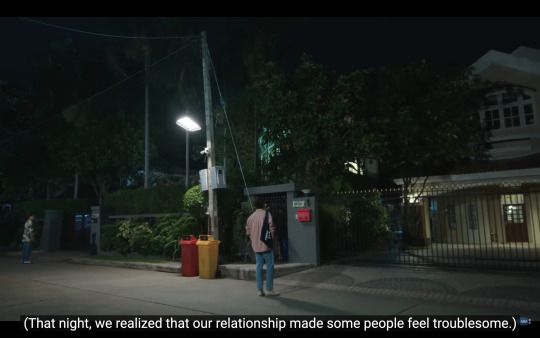
The secret that Pran and Pat keep about their relationship is strategic. It's certainly also a stress point: an older Pat asks an older Pran, at the end of episode 12, if he'll ever be able to walk through the front door of the Siridechawat house.
But this is the compromise -- within the larger-scale culture of secret-keeping in Asian societies, AND the private frameworks of the enmity that Dissaya and Ming established between themselves and their families years and years prior -- that will work best for Pat and Pran to preserve the sanctity of their relationship, which I talked about in part 2 of this meta series.
Pran and Pat do not have to publicly appear disobedient to the demands and pressures of their families. They do not have to make their families engage with each other. They do not have to make their families confront the mistakes that their parents made earlier in their lives. They can protect their families from their private and public follies. They can help their families keep and save face. And by doing all that? They can prevent their relationship from being threatened.
I feel this very deeply in my heart as an Asian-American. For the sake of my American spouse, I wanted to protect him from a lot of these pressures, and so I insisted on keeping a lot of our relationship secret from my folks. If I demanded full-blown, public acceptance from my parents? If I brought my "boyfriend" to parties, and introduced him as such with aunties and uncles -- especially if it wasn't indicated that we'd be permanent one day? Damn. No. I'd be embarrassing my folks, with the aunties and uncles saying to my folks, "dang, you can't control your daughter, huh? You let her do what she wants." That would mean my parents would lose face over their ability to control the lives of their children, and that's no bueno in our cultural terms. It would be on ME, as THEIR child, to uphold THEIR ability to save face, as much as its their own work.
Dissaya refers DIRECTLY to Pran doing this FOR HER when, in episode 10, she asks him, "did you forget to save my reputation?" It's brutal, daily work. And Pran goes BACK to keeping secrets in the end, because it would have been impossible, ultimately, for Dissaya to save face, AND for Pran to save Dissaya's reputation/face, if Pran were out with his relationship with Pat, thus proving his disobedience. It would be -- JUST -- better to keep the secret for all those involved.
As this post has gotten long, I'm going to continue talking more about these touchpoints in a second post. I'm driven to talk about this because I think much of the Western fandom might miss what us Asians are reading into shows like Bad Buddy through this coded language and engagement. I very much posit that Bad Buddy -- while it is first and foremost a queer show, made by queer Asians, about queer young men -- is so relatable to so many of us because we've faced similar struggles of survival, and we've faced threats to the sanctity of the love we have for other people by way of needed to fit into the roles set before us by previous generations.
So! With that, thank you for reading, and see you tomorrow, when I focus on competition, enmeshed family boundaries, patriarchy and sexism in Bad Buddy, and more if I can fit it in!
(Tagging @dribs-and-drabbles, @solitaryandwandering, and @wen-kexing-apologist by request! If you'd like to be tagged, please let me know!)
[Alright! Stay tuned for more, many more ruminations from the BBS Asian station tomorrow!
Here's the status of the Old GMMTV Challenge watchlist. Tumblr's web editor loves to jack with this list, so mosey on over to this link for the very latest version!
1) The Love of Siam (2007) (movie) (review here) 2) My Bromance (2014) (movie) (review here) 3) Love Sick and Love Sick 2 (2014 and 2015) (review here) 4) Gay OK Bangkok Season 1 (2016) (a non-BL queer series directed by Jojo Tichakorn and written by Aof Noppharnach) (review here) 5) Make It Right (2016) (review here) 6) SOTUS (2016-2017) (review here) 7) Gay OK Bangkok Season 2 (2017) (a non-BL queer series directed by Jojo Tichakorn and written by Aof Noppharnach) (review here) 8) Make It Right 2 (2017) (review here) 9) Together With Me (2017) (review here) 10) SOTUS S/Our Skyy x SOTUS (2017-2018) (review here) 11) Love By Chance (2018) (review here) 12) Kiss Me Again: PeteKao cuts (2018) (no review) 13) He’s Coming To Me (2019) (review here) 14) Dark Blue Kiss (2019) and Our Skyy x Kiss Me Again (2018) (review here) 15) TharnType (2019-2020) (review here) 16) Senior Secret Love: Puppy Honey (OffGun BL cuts) (2016 and 2017) (no review) 17) Theory of Love (2019) (review here) 18) 3 Will Be Free (2019) (a non-BL and an important harbinger of things to come in 2019 and beyond re: Jojo Tichakorn pushing queer content in non-BLs) (review here) 19) Dew the Movie (2019) (review here) 20) Until We Meet Again (2019-2020) (review here) (and notes on my UWMA rewatch here) 21) 2gether (2020) and Still 2gether (2020) (review here) 22) I Told Sunset About You (2020) (review here) 23) YYY (2020, out of chronological order) (review here) 24) Manner of Death (2020-2021) (not a true BL, but a MaxTul queer/gay romance set within a genre-based show that likely influenced Not Me and KinnPorsche) (review here) 25) A Tale of Thousand Stars (2021) (review here) 26) A Tale of Thousand Stars (2021) OGMMTVC Fastest Rewatch Known To Humankind For The Sake Of Rewatching Our Skyy 2 x BBS x ATOTS (re-review here) 27) Lovely Writer (2021) (review here) 28) Last Twilight in Phuket (2021) (the mini-special before IPYTM) (review here) 29) I Promised You the Moon (2021) (review here) 30) Not Me (2021-2022) (review here) 31) Bad Buddy (2021-2022) (thesis here) 32) 55:15 Never Too Late (2021-2022) (not a BL, but a GMMTV drama that features a macro BL storyline about shipper culture and the BL industry) (review here) 33) Bad Buddy (2021-2022) and Our Skyy 2 x BBS x ATOTS (2023) OGMMTVC Rewatch (The BBS OGMMTVC Meta Series is ongoing: preamble here, part 1 here, part 2 here, more reviews to come) 34) Secret Crush On You (2022) (on pause for La Pluie) 35) KinnPorsche (2022) (tag here) 36) KinnPorsche (2022) OGMMTVC Fastest Rewatch Known To Humankind For the Sake of Re-Analyzing the KP Cultural Zeitgeist 37) The Eclipse (2022) (tag here) 38) GAP (2022-2023) (Thailand’s first GL) 39) My School President (2022-2023) and Our Skyy 2 x My School President (2023) 40) Moonlight Chicken (2023) (tag here) 41) Bed Friend (2023) (tag here) 42) Be My Favorite (2023) (tag here) 43) Wedding Plan (2023) 44) Only Friends (2023) (tag here)]
#bad buddy#bad buddy meta#bad buddy the series#bad buddy the series meta#backaof noppharnach#aof noppharnach#ohmnanon#ohm pawat#nanon korapat#patpran#pat x pran#pran x pat#the bbs ogmmtvc meta series#turtles catches up with old gmmtv#the old gmmtv challenge#ogmmtvc#turtles catches up with thai BLs#turtles catches up with the essential BLs#asian intergenerational trauma#intergenerational trauma#asian themes in bad buddy#saving face in asian cultures#asian cultural touchpoints in bad buddy
65 notes
·
View notes
Text

“is devo scared of the dark?” “not yet”
#so fun fact i listened up until the cambria arc when ethersea came out#and relistening/finishing it years later this was my touchpoint for where i listened to. bc i remembered very little#but this scene was cooked into my brain#taz#the adventure zone#my art#devo le main#taz ethersea
3 notes
·
View notes
Text
5 songs, 3 outfits
tagged by @corvosattano, @carlosoliveiraa, @voidika, @g0dspeeed, and @socially-awkward-skeleton, @inafieldofdaisies, and @aceghosts to do this fun little game 🧡🧡🧡

sun bleached flies // ethel cain
"god loves you but not enough to save you," so, baby girl, good luck taking care of yourself; so i said fine, 'cause that's how my daddy raised me: if they strike once, then you just hit 'em twice as hard.
crossroads // tracy chapman
all you folks think you own my life, but you never made any sacrifice. demons, they are on my trail; i'm standing at the crossroads of hell
knockin' on heaven's door // bob dylan
mama take this badge off of me, i can't use it anymore. it's getting dark, too dark to see. i feel i'm knockin' on heaven's door
baptize me // x ambassadors, jacob banks
i been prayin' for redemption, learnin' my lessons, my pain is my therapy
eight // sleeping at last
i want to break these bones 'til they're better, i want to break them right and feel alive


dear reader // taylor swift
dear reader, bend when you can, snap when you have to
bastards // kesha
i got too many people i got left to prove wrong; all those motherfuckers been too mean for too long
them dirty bones // mike waters
here i go, i'm not shaky but i'm weak at the knees, and i don't even know if anybody's even listening to me, but i'll grow old; lead the way so i might as well risk it, I don't wanna die and never know
hercules // sara bareilles
i miss the days my mind would just rest quiet. my imagination hadn't turned on me yet. i used to let my words wax poetic, but it melted at a puddle at my feet
heroes & thieves // vanessa carlton
well, i'm stubborn and wrong, but at least i know it. i keep moving along and hope i can get through this

tagging: @marivenah, @cassietrn, @trench-rot, @harmonyowl, @fourlittleseedlings, @purplehairsecretlair, @locustandwildhoney, @testyfestyenthusiast, @strangefable, @sharkyboshaw, @finding-comfort-in-rain, @alexxmason, @deputyash, @josephslittledeputy, and anyone else who wants to give it a go! (taglist opt in/out)
#syb's default fashion really is just: tight jeans. tanktop. (leather) jacket and stompy boots#i had such a hard time finding good pics for hers :'( like i had a few touchpoints/insp#but most of the images i found just didn't showcase the actual outfit enough. or the lighting was atrocious.#also there was a moment where i considered just making syb's mini-playlist entirely ethel cain. i could've. but i didn't.#no paola this time because she's remarkably difficult to find fitting songs for so you're getting saoirse instead#oc: deputy sybille la roux#oc: saoirse monaghan
26 notes
·
View notes
Text

2 notes
·
View notes
Text
Send me "Don't Deal with a Dragon" and I'll talk about how I would translate your muse into a Shadowrun character! They may either be as Runners (PCs) themselves, NPCs, or maybe even plot-point characters and oddities to help improve a campaign or storyline~
Shadowrun [noun]: Any movement, action, or series of such made in carrying out plans which are illegal or quasilegal. -- WorldWide WorldWatch 2050 archive
#[ I'll be using SR5 as my touchpoint because that's what I know the best ]#[ Shadowrun Propaganda mode: Activate ]#[ Gush about my friends' characters mode: Activate ]#// Feel free to reblog and steal#But What’ll I Fund the Lab With!? | Ask Prompt
2 notes
·
View notes
Text
one of the most vivid scenes in my head man. after the choking fires of the end of her world, the complete silence of the soul plains as she moved the moons against their natural rhythm, reina waking up to birdsong. to nature. a slow surreal waking.... towards the end, very few natural places had been left on nerice, and definitely none in the carnage of its destruction. and here she is, waking to a new world, untouched, wild, like hers used to be. a lush field where she is found by the songhosts, a brilliant expanse a breath hope the future. until azra impacts and leaves a kilometer wide crater, razing all surrounding life. the very same impact crater where centuries later arianna would build the palace, the barren field that leah wld turn into lush grass once again when she steals a fragment of reina's power at the end of lhnh,,,,,
#SO SOFT ABT IT......#other fun angle i ofc have to mention here. the absolute silence of the soul plains except :)#gray was there. watching reina move the moons. he talked to her. but she was too consumed with the effort the ridiculous amt of power#and that is the version of her that's burned into his mind. the all powerful first true ruler. even linnea pales in comparison#THE ALMOST TOUCHPOINTS BTWN THEM. AUGH#shadowblogging#propaganda in tags sorry. the mold is winning these days for obv reasons
3 notes
·
View notes
Text
vacation start

#made the counselor reschedule our touchpoint for after i get back#no bro im not going over the legalese with you on a friday good riddance#god bless him tho he cool 😂#real talk#corporate clown ava
7 notes
·
View notes
Text
Turtles Catches Up With Old GMMTV: The Bad Buddy Rewatch Edition, Part 3b -- More on BBS and Asian Cultural Touchpoints
[What’s going on here? After joining Tumblr and discovering Thai BLs through KinnPorsche in 2022, I began watching GMMTV’s new offerings -- and realized that I had a lot of history to catch up on, to appreciate the more recent works that I was delving into. From tropes to BL frameworks, what we’re watching now hails from somewhere, and I’m learning about Thai BL's history through what I’m calling the Old GMMTV Challenge (OGMMTVC). Starting with recommendations from @absolutebl on their post regarding how GMMTV is correcting for its mistakes with its shows today, I’ve made an expansive list to get me through a condensed history of essential/classic/significant Thai BLs produced by GMMTV and many other BL studios. My watchlist, pasted below, lists what I’ve watched and what’s upcoming, along with the reviews I’ve written so far. Today, I offer the second half of the third (ha!) of five posts on Bad Buddy. I'll look today at themes that myself and fellow Asian fans of Bad Buddy have caught and related to in this wonderful show.]
Here are links to part 1, part 2, and part 3a of the BBS OGMMTVC Meta Series. Today's post is a continuation of part 3a. Part 4 is here.
Yesterday, I began an unwinding about what I am calling the "Asian Cultural Touchpoints" of Bad Buddy -- the Asianness of Bad Buddy that is rooted and coded in the way people interact with each other.
As a quick recap from yesterday: I have been insanely lucky to engage in conversation with a number of legendary Asian BBS stans about the Asianness within Bad Buddy: huge shout-outs and thanks go to @grapejuicegay, @recentadultburnout, @telomeke, @neuroticbookworm, and @lurkingshan (who is not Asian, but has Asian relatives and is well-versed in the nuances of our cultures!). We captured a lengthy list of Asian cultural signposts in Bad Buddy and we've been having great discussion around them, including:
1) saving face, 2) intergenerational/inherited trauma, 3) the unique nature of secret-keeping in Asian cultures/societies, 4) enmeshed family boundaries, 5) setting up children to compete against each other for the sake of familial pride, 6) patriarchy, sexism, and the reversal of sexism among next generations, 7) the inset/assumed roles of family members based on patriarchy and elder respect, 8) assumed community within and external to one's family, usually based on where you live and where you go to school, 9) how one's identity is defined based on patriarchy and individualist vs. collectivist cultures, 10) how various cultures within an Asian nation live peacefully (or not) together (for example, what makes Pat and Pran different by way of Pat's Thai-Chinese heritage vs. Pran's ethnic Thai heritage),
and many more.
I unwound yesterday on the cultural touchpoints of saving face, intergenerational/inherited trauma (partly as a follow-up from my very first thesis on Bad Buddy), and the singular nature of secret-keeping in Asian cultures.
There's no way I can get through this entire list in two posts, but I do want to touch upon competition, enmeshed family (and friend, sometimes) boundaries, and patriarchy and sexism as three other cultural touchpoints that engendered quite a bit of conversation among our BBS mini-village.
Competition: ALL OVER BAD BUDDY. All over it, and we know it, and for the most part, we love Pran's and Pat's little love battles. Pat and Pran are constantly competing. Pat gets Chief Phupha into it in Our Skyy 2, dang it ("I'm Pha Pun Dao's top-notch," Phupha, psh). We don't know if the guys can function without having a competition going between them at any given point.
We know this structure started with their parents. As I talked about yesterday, considering the trauma that Ming and Dissaya faced in their young lives -- the trauma that they passed down to Pat and Pran, the rivalry and almost unbridled hatred that they expected Pat and Pran to embody -- all of that emanated through competition between the guys. Their parents asked them, daily, how the other kid was doing in school, making sure that their son was winning on top. As we know from Pat's rooftop monologue in episode 5, that was baggage he carried with him his entire life.
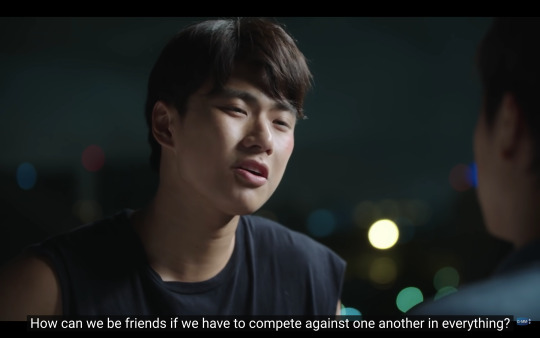

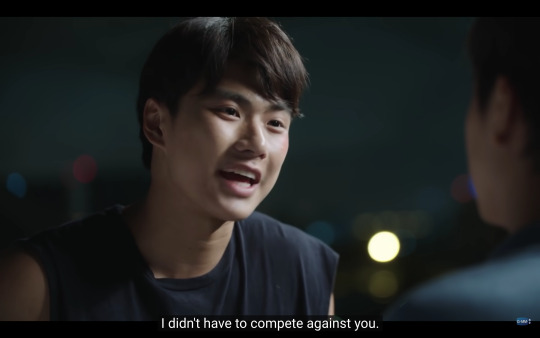

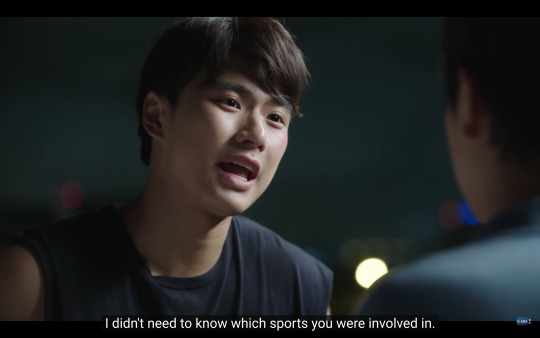
So many of these cultural touchpoints can be connected to the idea of saving face, as I wrote about yesterday. It is an overarching rule of any Asian child's life that Asian parents demand to be able to brag about their kids. Give me an Asian kid whose parents didn't do that to them, and I'll give that kid a huge hug, a gold medal, and a wish in an envelope that I could have had their childhood. Awards, top grades, top class positions, top university admissions: the need to be the best is neverending, for the sake of a parent not losing face for their child not succeeded at the top level of everything.
@telomeke notes the inherent cultural demands of Pran's and Pat's family in the competition paradigm that Pat outlines above.
[Re: Ming and Dissaya]: [E]very time [the children] do well, the bar often gets pushed a little higher. We actually see Ming doing this to Pat in Ep.1 ... when Pat tells him he was made class president. Ming says something like "get yourself a gold medal for rugby and then I'll let you brag"; Pat's achievement (though not dismissed) is downplayed rather than celebrated, and another goal is set. Anyway, my read is that both the boys had caliber to start with; it's natural to Pran (we don't see Dissaya really pushing him to excel), and I think he pushes himself to excel, to be the virtuous paragon of everything, as a barrier to the outside world, and to protect his vulnerable, secret interior. ... And Pat was pushed by Ming to match Pran's achievements, though not for the usual Asian parent reasons – it was to continue his own efforts to best Dissaya, IMO...
What @telomeke outlines here correlates perfectly with my own experiences of my Asian childhood: that even in the face of successes that my parents demanded, the reward was only a passive comment that I had to be doing more. There was never a moment where a parent's cup of happiness was truly filled from the child's perspective.
However, in the case of Pran and Pat specifically: @grapejuicegay had a further illumination that highlighted the utter pain and sadness of the outcomes and consequences of their lifelong competition. We know they were perfectly paired as a couple in love. But ultimately? Because of the pressures they faced as children vis à vis each other -- they also become the only people who could compete with each other. AND, because of that reality -- a new kind of empathy sprung up between them, what I called in part 1 of this series a radical empathy of a kind we don't always see between enemies to lovers. @grapejuicegay's thoughts:
I'm just thinking about the first family interactions we see for Pat and Pran and how Dissaya is framed as a concerned parent with her main worry being Pran taking on too much on his plate with being the head of the department. But also how that's so far removed from what her influence had made of him - an overachiever to the highest degree. ...[T]he whole point of Pat and Pran is that they're evenly matched in everything (which works so well because they're both such EXTRA little shits with so many lil' interests), and it's been there since the [original] trailer. They both keep competing to see who can get the most achievements to brag about, eventually settling down to a point where they help each other out because they're each other's only worthy competition because they're the only ones who can keep up with each other [emphasis mine]. So.... Dissaya's concern is nice and all, but she created this monster who not only can handle having so many responsibilities, but ENJOYS it. And Pat's help is always pushing him to do all of it, just have some help along the way so he's not doing it all alone. Wai helps, but he has to be manipulated into it. So the only person ACTIVELY helping Pran even when neither of them thinks he needs it is Pat ("I know you can do it, but I want to do it for you").
I was tremendously moved when @grapejuicegay shared her read with me on this, because not only did it land fully with me -- but it served to highlight the sadness and loneliness that existed in the gulf between Pran and Pat prior to their union. In other words, because they knew, so well, HOW to compete with each other -- if they needed help, they were the only ones who knew HOW to help each other. Pat showing up at the dilapidated bus station; Pran showing up at the empty auditorium. They could vibe when each other needed a little push. They knew WHEN and HOW to help each other, with the fluency they had ABOUT each other, even before their relationship began -- because they had been competing all their lives. As Pat said in Our Skyy 2: "we've been neighbors all our lives." They knew each other's ins and outs better than even their families did.
The competition that Pran and Pat engaged in had significant cultural roots. But the long-term impact of that competition? It rendered the guys on their own lonely island, a place where only the two of them could understand each other fully. It's a romantic conclusion -- to know your partner so well like that, it can fill your heart with nostalgic reckoning. But as Pat said above and to his father -- it was a bruising path, for the both of the guys.
There's a lot to enmeshed boundaries in Bad Buddy. The boundaries that SHOULD exist between two people that regularly get crossed. I definitely want to acknowledge, before I unwind on these boundaries, that Western vs. Asian viewers will have different expectations of exactly what enmeshment looks like and what it means. I'll have more on this in a bit.
When I think of enmeshed boundaries in Bad Buddy, I think of Dissaya having almost total control over Pran's physical placement. Of Ming knocking on Pat's dorm door, unannounced. Of Pat's expectation that Pa would do his laundry (which will speak to the sexism I'll talk about in a bit). @neuroticbookworm noted how hilariously Asian it was that Pat and Pa -- older brother and younger sister -- literally shared a dorm room. Pat could scuttle to Pran's solo room, to their love nest, to leave their shared room alone for Pa and Ink. But: what an Asian set-up, to have big bro sleeping on the floor, while little sister got the bed.
But besides what Western viewers might traditionally think of as "unhealthy" enmeshed boundaries, there's also a conversation about how Asian families engage -- or, don't engage -- with expectations of privacy. The biggest and most obvious example of a violation of personal privacy in BBS is that Pran's and Pat's parents forbid their children from having friendship with the kid next door. We know, in the end, that the parents cannot control that behavior of their kids, and yet, the parents try to do so anyway, with traumatic results.
@telomeke talked in our mini-village about the everyday functionality of Asian families crossing borders of assumed privacy. These are crossings that I fully relate to: for instance, I wasn't allowed to lock my bedroom door very often when I was growing up, to allow for complete access to my "private space," even and especially while I was in it.
I remember this as a thing growing up, that it's perfectly fine in [Asian countries] to drop in unannounced when it's family (though I think with widespread cellphone availability, people do check in beforehand now – however it could also be just to make sure there's someone in to receive them when they drop by!). It's a bit of a truism that the more traditional Asian parents will be in every part of your life and may not always know how to give you more distance when you grow older. ... For the more traditionally-minded, I think this phenomenon would be even more pronounced. And we definitely see this with Pat and Pa too.
The stories I heard about parents busting in on their Asian kids in compromising positions because the kids HAD to leave the doors unlocked? Stories about full-grown adults being interrupted in their intimacy because their parents came into the house? Countless stories. Us as Asians -- we might laugh about it, but there's also an unspoken and inherent sense of annoyance, of fear, of "how do I explain this now?" that's like a dull, permanent foreboding.
In thinking about how these boundary-crossings were inherited vis à vis Pat and Pran, into the next generation, of course -- all we have to think about are the many, many times we saw Pat crossing into Pran's threshold at Tinidee. That shot of Pat wrapped in his comforter as he shuffles to Pran's door.
However, @grapejuicegay flagged for me an utterly legendary Bad Buddy meta post written by @transpat now nearly two years ago, describing the Indian concept of haq, a concept I know very dearly well. To quote @transpat on the definition of haq:
in context of relationships, we use it to describe the entitlement ppl we keep close are allowed over us. in our culture, with every bond we form and built, we owe those ppl certain rights over us. like our filial duty to our parents, supporting our siblings and relatives emotionally and/or financially, the loyalty to our friends. lovers and spouses are ppl given all the rights of a family member by choice and obv other stuff like touching u in ways others can't, sharing worries and secrets you wouldn't indulge others w, the permission to carry and lighten ur burdens.
We know so well that Pat didn't just cross the hallway of Tinidee; he climbed through and over windows, over roofs, to get to Pran. And Pran... let him in. We know now what Pran's feelings were all that time, at least from 10th grade to university. Of course, Pran would let Pat in, because he had already let Pat into his heart. Maybe not into his psychological safety zone -- that had to take much longer. But in a much more primal sense, Pran had let Pat in, for so many reasons beautifully illustrated by @transpat in their piece, and for the examples up above, especially by way of the inadvertent closeness they achieved through their never-ending competing with each other.
I want to take a quick moment to highlight the two concepts I bolded above in @transpat's description of haq. I don't know if I have the words to describe this as well as @transpat, but to the point of entitlement and having rights over someone... there's a certain sense in Asian group dynamics, that one's business is everyone's business, if that makes sense. Think about cliques when you were growing up. Those cliques were formed on similar desires and interests -- being rich, beautiful, "cool," etc.
I feel like Asian group dynamics go a bit beyond this. Because you are in a group, it must go that any one single person's business is everyone's business. There is an entitlement to information about other people. In the States, we value individualism, and when these cliques are being formed in our youthful years, there's certainly a clash with people wanting to express themselves as individuals; very often, the group dynamics do not allow for individual expression. I would argue that that's even more strong in Asian circles.
If I could describe what I think was happening when Pat was climbing into Pran's window to, say, make that first deal about getting Wai to apologize -- I do very much believe that Pat felt it was his intimate right to go into Pran's room, as it had been established that they were, once more, schoolmates and neighbors, now that Pran was back in his family home. If Pran filled those roles -- schoolmate, neighbor -- it automatically clicked into Pat's social expectations that Pran was there to be talked to and engaged with, no matter if Pran would try to push him out. We know that Pran would give up on pushing Pat out, because Pran had feelings for Pat. BUT: what I love about @transpat's INCREDIBLE meditation is that Pat also clicked into unspoken social roles that allowed him to seek out a moment of friendly intimacy with Pran. (Besides the fact that it's more theorized now that Pat had unknown attraction for Pran during high school -- but I don't think attraction was what brought Pat into Pran's room to discuss that very first deal.)
I think this meditation on enmeshed boundaries, as I mentioned earlier, feeds nicely into the final points I want to make about the last cultural touchpoint for analysis, that of patriarchy and sexism in Asian families.
The BBS mini-village sliced and diced the incredibly overarching examples of patriarchy in this story, as emanating mostly from Ming: Ming's role as the head of the family and doling out roles; Ming ensuring that Pat would "not forget" Ming's reputation at university; Ming's parents doing nothing to interfere with Pa's role as serving Pat; Pat reinforcing that role to Pa in the family home.
Why Ming? As @telomeke broke it down for us: Ming is the head of the household of a Thai-Chinese family. It's not to say that patriarchy and sexism don't exist in ethnic Thai families -- but a patriarchal dynamic isn't shown in Pran's house, as Dissaya is the one who holds the emotional control over the Siridechawats. It's in the Jindapat household that we see old-fashioned roles of men and women doled out.
In traditional Chinese society (before the Communists came to power in China), sons had absolute pride of place in Chinese families, and we see Ming giving special treatment to Pat, while Pa was made to clean up after Mr. Jindapat Jr, doing his laundry, having the piece of chicken she wanted stolen by him in Ep.1, etc... Ming invited Pat home for a meal in Ep. 7, but didn't mention Pa, and Pat had to say he'd bring her along. But Pat and Pa, away from home didn't care for any of this, (e.g., when they were kids Pat let Pa win the bicycle race and skip washing up duties, in the Ep.1 flashback), and while Pa would begrudgingly do Pat's laundry, she would give as good as she got as well whenever they tussled (verbally).
As @telomeke says above, we see Pat, within his generation, to Pa, in their own private space of bicycling outside or moving into his own dorm room, quietly dismantling that patriarchy and sexism of Ming's and Pat's mom -- letting Pa win the bicycle race; talking out of earshot of their parents about Pat protecting, instead of hurting, Pran. [Another great example, a little outside of the patriarchal example but still worth noting, is Wai's role, as a stand-in for Dissaya, sticking to the definitions of the role of Pran's best friend, but showing -- within the cohort of his own generation -- that he CAN change to accept Pat in Pran's life, as opposed to Dissaya's inability to do so (scroll down through the whole liveblog post for the commentary!).]
@telomeke mentioned in our conversation about patriarchy and sexism that he was surprised that he'd see a parent as young as Ming -- a parent to a student of Pat's age, much younger than myself and @telomeke -- keep up with these traditional, old-fashioned values. I think that's a great point, especially in the way that Ming ignores Pa only until the end of the series, when he's instead cut Pat mostly out of his caring reach for disobeying him. We know from the Soonvijarn analysis and reaction videos by Aof Noppharnach and his collegial community of filmmakers, that Aof took inspiration for Ming stealing the scholarship from Dissaya from a real-life occurrence of the same story. I think Aof intentionally had such strong patriarchal structures in Bad Buddy vis à vis the Jindapats in order to highlight what a stronghold old-fashioned notions of life have on generations -- and intended to have a conversation vis à vis Pat, Pran, Pa, and Wai, that the ways in which these old-fashioned notions are updated over time, is through the work of the subsequent generations of children growing up and learning and knowing better.
The coded Asianness of Bad Buddy... god. I could sit with my fellow Asians and talk about the coded Asianness of Bad Buddy for at least weeks, if not maybe even a year or two. We could laugh about the comedy of many of the experiences or traumas we have faced vis à vis the cultural touchpoints that I've listed and analyzed, and we could also share our shared pain, our shared joys, our shared ways in which we express emotion, love, our highs and lows, through our shared Asian cultures. Talking about this makes me tremendously glad that there's national and international fandoms watching Asian shows -- even if, say, Western viewers can't exactly pinpoint what's happening by way of a culturally contextual moment in Bad Buddy, at least there's a community of Asian bloggers out here that can unwind what might be confusing.
Once more, I want to thank @recentadultburnout, @grapejuicegay, @telomeke, @neuroticbookworm, and @lurkingshan for engaging me in such amazing and extensive conversation about the best show ever Bad Buddy. More than education -- the process was INCREDIBLY fun and rewarding.
(Tagging @dribs-and-drabbles, @solitaryandwandering, and @wen-kexing-apologist by request! If you'd like to be tagged in this series, please let me know!)
[WHEW! SEVENTH INNING STRETCH, FRIENDS, stand up and stretch yer arms as I crack my knuckles one more time for this fabulous show! My last post for the BBS OGMMTVC Series -- a breakdown of my theorized reasons and timing regarding Pran leaving for Singapore -- drops next week. Stay tuned!
And after this, I take the tiniest break from the OGMMTVC to review one of the most important shows of 2023: La Pluie. And then I'm back on my tip with Secret Crush On You and an end-of-the-year rewatch of KinnPorsche. So, much more to come!
Here's the status of the Old GMMTV Challenge watchlist. Tumblr's web editor loves to jack with this list, so please head to this link for the very latest updates!
1) The Love of Siam (2007) (movie) (review here) 2) My Bromance (2014) (movie) (review here) 3) Love Sick and Love Sick 2 (2014 and 2015) (review here) 4) Gay OK Bangkok Season 1 (2016) (a non-BL queer series directed by Jojo Tichakorn and written by Aof Noppharnach) (review here) 5) Make It Right (2016) (review here) 6) SOTUS (2016-2017) (review here) 7) Gay OK Bangkok Season 2 (2017) (a non-BL queer series directed by Jojo Tichakorn and written by Aof Noppharnach) (review here) 8) Make It Right 2 (2017) (review here) 9) Together With Me (2017) (review here) 10) SOTUS S/Our Skyy x SOTUS (2017-2018) (review here) 11) Love By Chance (2018) (review here) 12) Kiss Me Again: PeteKao cuts (2018) (no review) 13) He’s Coming To Me (2019) (review here) 14) Dark Blue Kiss (2019) and Our Skyy x Kiss Me Again (2018) (review here) 15) TharnType (2019-2020) (review here) 16) Senior Secret Love: Puppy Honey (OffGun BL cuts) (2016 and 2017) (no review) 17) Theory of Love (2019) (review here) 18) 3 Will Be Free (2019) (a non-BL and an important harbinger of things to come in 2019 and beyond re: Jojo Tichakorn pushing queer content in non-BLs) (review here) 19) Dew the Movie (2019) (review here) 20) Until We Meet Again (2019-2020) (review here) (and notes on my UWMA rewatch here) 21) 2gether (2020) and Still 2gether (2020) (review here) 22) I Told Sunset About You (2020) (review here) 23) YYY (2020, out of chronological order) (review here) 24) Manner of Death (2020-2021) (not a true BL, but a MaxTul queer/gay romance set within a genre-based show that likely influenced Not Me and KinnPorsche) (review here) 25) A Tale of Thousand Stars (2021) (review here) 26) A Tale of Thousand Stars (2021) OGMMTVC Fastest Rewatch Known To Humankind For The Sake Of Rewatching Our Skyy 2 x BBS x ATOTS (re-review here) 27) Lovely Writer (2021) (review here) 28) Last Twilight in Phuket (2021) (the mini-special before IPYTM) (review here) 29) I Promised You the Moon (2021) (review here) 30) Not Me (2021-2022) (review here) 31) Bad Buddy (2021-2022) (thesis here) 32) 55:15 Never Too Late (2021-2022) (not a BL, but a GMMTV drama that features a macro BL storyline about shipper culture and the BL industry) (review here) 33) Bad Buddy (2021-2022) and Our Skyy 2 x BBS x ATOTS (2023) OGMMTVC Rewatch (The BBS OGMMTVC Meta Series is ongoing: preamble here, part 1 here, part 2 here, more reviews to come) 34) Secret Crush On You (2022) (on pause for La Pluie) 35) KinnPorsche (2022) (tag here) 36) KinnPorsche (2022) OGMMTVC Fastest Rewatch Known To Humankind For the Sake of Re-Analyzing the KP Cultural Zeitgeist 37) The Eclipse (2022) (tag here) 38) GAP (2022-2023) (Thailand’s first GL) 39) My School President (2022-2023) and Our Skyy 2 x My School President (2023) 40) Moonlight Chicken (2023) (tag here) 41) Bed Friend (2023) (tag here) 42) Be My Favorite (2023) (tag here) 43) Wedding Plan (2023) 44) Only Friends (2023) (tag here)]
#bad buddy#bad buddy meta#bad buddy the series#bad buddy the series meta#backaof noppharnach#aof noppharnach#ohmnanon#ohm pawat#nanon korapat#patpran#pran x pat#pat x pran#the bbs ogmmtvc meta series#turtles catches up with old gmmtv#the old gmmtv challenge#ogmmtvc#turtles catches up with thai BLs#turtles catches up with the essential BLs#asian themes in bad buddy#patriarchy and sexism in bad buddy#enmeshed boundaries in asian culture#enmeshed boundaries in bad buddy#competition in bad buddy#competition in asian culture#asian cultural touchpoints in bad buddy
48 notes
·
View notes